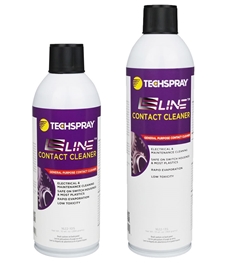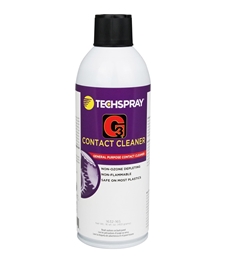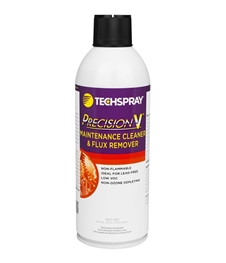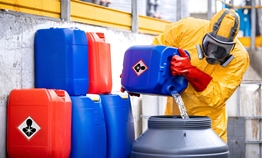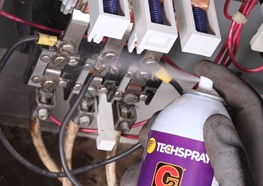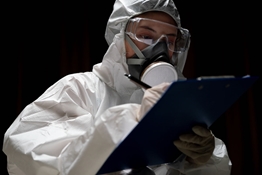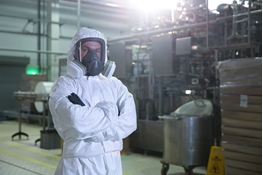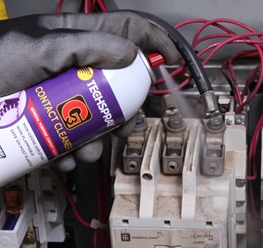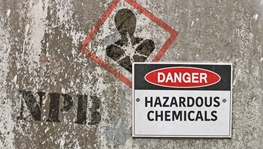Blast Oil, Carbon Deposits & Other Contamination Off Electrical Contacts
A contact cleaner is also called electrical cleaner, switch cleaner, electrical contact cleaner, and, specific to automotive repair, battery terminal cleaner. It is a solvent cleaner designed to remove contamination from electrical contacts, or the conductive surfaces of connectors, switches and other electrical and electronic components with moving surface contacts.
The goal is to quickly remove insulative contamination as quickly as possible, avoiding a lot of wiping and scrubbing if possible. Contact cleaning solvents usually come in pressurized aerosol packaging for convenience and to provide a forceful spray that creates agitation and reaches into all the crevices of the connectors.
Techspray offers a wide variety of electrical contact cleaners in spray and bulk packaging. Our contact cleaners remove oxidation, oil, and other contaminants from contacts, metal switches, motors, relays, generators, edge connectors, buss bars, circuit breakers, scales, and sensors.
Advantages of Techspray contact cleaners:
- Powerful cleaners - grease and oil flow right off
- Safer solvents - do not contain TCE, nPB or Perc
- Safe on the most common plastics
- Available in spray can and bulk packaging.
Dielectric Breakdown
Flammability
Plastic Sensitivity(Choose One)
Environmental & Safety
Applied Filters
FAQ's
- Spray force - Aerosol cleaners are generally used to penetrate into the tight areas around the contact and provide agitation.
- Dielectric strength - If you are cleaning energized (powered) equipment, use a cleaning solvent with a dielectric strength of 30 kV (30,000V) or higher. This prevents shorting the equipment. Dielectric strength is defined as the maximum electric field that the material can withstand under ideal conditions without breaking down. Breaking down in this sense is described as a failure of insulating properties, where the electricity breaks free of the conductors and burns a path through the weakest area of the insulating materials.
- Solvency / cleaning strength - The solvent cleaner needs to be strong enough to dissolve oil and other contamination.
- Flammability - If there is risk of flames or sparks, a nonflammable solvent is recommended.
- Evaporation rate - Since there isn't opportunity to wipe the solvent off the inner parts of the electrical device, fast evaporation is very helpful.
- Plastic compatibility - Electrical devices often contain plastics and gasketing material that can be damaged by harsh solvents.
- Additives - Some cleaners, like WD40, contain oils that are left behind. That can be a good way to prevent oxidation, but it depends on your application and equipment. In some cases, it could be considered a contamination -- especially silicone oil, which tends to migrate.



